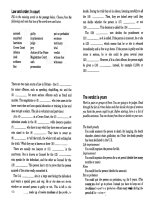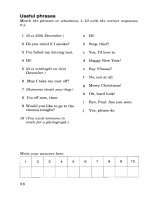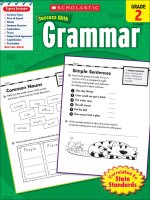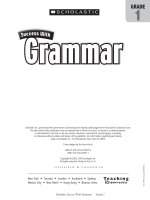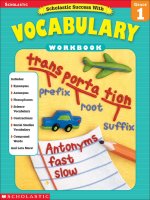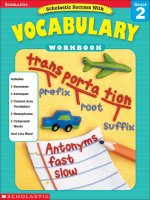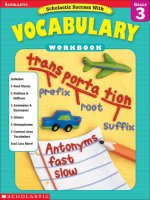scholastic success with vocabulary grade 5
Bạn đang xem bản rút gọn của tài liệu. Xem và tải ngay bản đầy đủ của tài liệu tại đây (2.08 MB, 84 trang )
4
Name
Where Would You Find These?
Mark the box next to the phrase that tells where you would most likely see each one.
Use a dictionary to help you.
Using a dictionary
Discover what these pairs of words have in common: asp and anaconda, anthurium and
amaryllis, artichoke and avocado, argali and addax.
1. allergist
in a doctor’s office
cutting trees
on a farm
4. albatross
in the desert
near the sea
in the ocean
7. auk
near water
near high mountains
near a farmhouse
10. adenoid
in your body
at the airport
by your VCR
13. alyssum
in the dairy case
in the air
in a flower garden
2. alpaca
in the ocean
in the city
in Peru
5. amphora
on a table
under the sink
in the trunk of a car
8. aphid
covering a table
on a plant
in a toolbox
11. aerialist
at a circus
at a concert
at a wedding
14. ascot
in a person’s shoe
around a neck
on a man’s head
3. agouti
in your body
in a tropical climate
in an art studio
6. anorak
in the deli
on the railroad
on your body
9. adze
in a dentist’s office
in a clothing store
in a toolshed
12. agate
in a feed store
in a rock shop
in a shoe store
15. albacore
in the water
in the air
crawling on the
ground
Scholastic Success With: Vocabulary, Grade 5 © Scholastic Teaching Resources
Page 4
1. in a doctor’s office; 2. in Peru; 3. in a
tropical climate; 4. near the sea; 5. on a
table; 6. on your body; 7. near a
farmhouse; 8. on a plant; 9. in a
toolshed; 10. in your body; 11. at a
circus; 12. in a rock shop; 13. in a flower
garden; 14. around a neck; 15. in the
water
5
Name
Homographs
A homograph is a word that is spelled just like another
word but has a different pronunciation and a different
meaning, as in the
bow of a ship and a bow and arrow.
Write the meaning of each underlined
homograph as it is used in the sentence.
Use a dictionary for help.
1. The doctor said when the wound
healed there
would be no scar.
__________________________________________________________________________________
2. Brittany wound the bright blue ribbon around Rosa’s ponytail.
__________________________________________________________________________________
3. Sam said he would r
efuse to go with us if it rains.
__________________________________________________________________________________
4. High winds had upset the garbage can, so Natasha and I went out and picked up
the r
efuse.
__________________________________________________________________________________
5. The entrance to the building was between two lofty pillars.
__________________________________________________________________________________
6. The puppeteer’s performance will entrance the fifth-grade students.
__________________________________________________________________________________
7. Tyler was surprised to see two graceful does in his back yard.
__________________________________________________________________________________
8. “Does Cameron get to go fishing with us tomorrow?” Garrett asked.
__________________________________________________________________________________
9. Matthew and Mariah decided to row their boat out to a little island in the lake.
__________________________________________________________________________________
10. There was quite a row among the robins when Shelby tossed some bread crumbs.
__________________________________________________________________________________
What Do You Mean?
Scholastic Success With: Vocabulary, Grade 5 © Scholastic Teaching Resources
Page 5
Check students’ definitions. Suggested
answers: 1. an injury to the body;
2. twisted; 3. unwilling to comply;
4. garbage; 5. place of entry; 6. carry
away with delight or wonder; 7. female
deer; 8. past tense of do; 9. to propel a
boat using oars; 10. a noisy disturbance
An antonym is a word that has the opposite or nearly opposite meaning to
another word.
Write the best word to complete each sentence.
1. When the creek overflowed, a __________ of water poured
over the bank. (torrent, trickle)
2. We waved goodbye and watched the car __________
down the road. (appear, vanish)
3. Josh was overwhelmed by the __________ amount of
work he needed to accomplish. (small, vast)
4. Rosa spent several hours solving the __________ puzzle. (intricate, simple)
5. The howling wind quickly knocked over the __________ building. (flimsy, solid)
6. No amount of polishing could change the __________ surface of the car.
(bright, dingy)
7. Audrey’s __________ paid off when she won first prize in the writing contest.
(diligence, laziness)
8. Nathan’s careful attention helped the plant to __________ . (wither, flourish)
9. The __________ meals always left the boy hungry. (scanty, generous)
10. The kind king’s subject felt __________ for him. (scorn, admiration)
11. Everyone was in a __________ mood after hearing the sad news. (joyful, grave)
12. It took several hours to tour the __________ home. (spacious, small)
13. The __________ day started and ended with rain. (cheerful, dismal)
14. Uncle Alfred admitted he needed to replace his __________ shoes. (worn, new)
6
Name
Antonyms
On another sheet of paper, write a sentence using three words that have antonyms. Have a
friend circle all three and write the antonyms.
Which Is Which?
Scholastic Success With: Vocabulary, Grade 5 © Scholastic Teaching Resources
Page 6
1. torrent; 2. vanish; 3. vast; 4. intricate;
5. flimsy; 6. dingy; 7. diligence; 8. flourish;
9. scanty; 10. admiration; 11. grave;
12. spacious; 13. dismal; 14. worn
7
Name
One or the Other
Homophones
A homophone is a word that sounds just like another word
but has a different spelling and a different meaning.
Circle the word that matches the definition.
1. to change in some way alter or altar
2. device for draping clothing hanger or hangar
3. rough, harsh coarse or course
4. twist ring or wring
5. look over casually brows or browse
6. unproductive baron or barren
7. units of measurement quarts or quartz
8. immovable stationery or stationary
9. a percussion instrument cymbal or symbol
10. the way something is done manor or manner
11. a place to live residence or residents
12. to travel in a boat crews or cruise
13. having two parts duel or dual
14. a bird of any kind foul or fowl
15. mournful sound groan or grown
16. building where the affairs of
government are conducted capital or capitol
On another sheet of paper, write a sentence using a pair of homophones. Then ask a friend to
define each of them.
Scholastic Success With: Vocabulary, Grade 5 © Scholastic Teaching Resources
Page 7
1. alter; 2. hanger; 3. coarse; 4. wring;
5. browse; 6. barren; 7. quarts;
8. stationary; 9. cymbal; 10. manner;
11. residence; 12. cruise; 13. dual;
14. fowl; 15. groan; 16. capitol
8
Name
Categorizing
Four of the five words listed in each set belong together
because they share something in common. Cross out
the word that does not belong. Write what the other
four words have in common on the line.
1. Iowa
Canada
Ohio
Florida
Arizona
2. maple
rose
iris
daffodil
petunia
3. tuba
cornet
bugle
piano
trumpet
4. South America
Africa
Europe
Asia
Greenland
5. Eli Whitney
Robert Louis Stevenson
Thomas Edison
Cyrus McCormick
Alexander Graham Bell
6. yams
tangerines
bananas
apples
grapes
7. oxygen
helium
chiffon
xenon
neon
8. duck
gull
condor
pelican
tern
9. Nile
Borneo
Amazon
Rhine
Yangtze
10. Atlanta
Salt Lake City
Omaha
Salem
Albany
11. ruby
indigo
crimson
scarlet
magenta
___________________
___________________
___________________
___________________
___________________
___________________
___________________
___________________
___________________
___________________
___________________
The Assembly Line
Scholastic Success With: Vocabulary, Grade 5 © Scholastic Teaching Resources
Page 8
1. Canada, U.S. states; 2. maple, flowers;
3. piano, brass instruments;
4. Greenland, continents; 5. Robert Louis
Stevenson, inventors; 6. yams, fruit;
7. chiffon, gases; 8. condor, water birds;
9. Borneo, rivers; 10. Omaha, state
capitals; 11. indigo, shades of red
9
Choose a word from above. Write a sentence that uses both forms of the word.
Name
What a Lovely Accent!
Homographs
A homograph is a word that is spelled the same as another word but has a different meaning.
The meaning of some homographs depends on which syllable is being accented.
Circle the word with the correct accented syllable for the underlined word
in each sentence.
1. The candy had to boil one more minute. 'min•ute mi•'nute
2. Lauren tried to guess what kind of object
would be in the box. 'ob•ject ob•'ject
3. They planned to present the winner with
a bronze trophy. 'pres•ent pre•'sent
4. Jasmine decided to build a pyramid for
her pr
oject. 'pro•ject pro•'ject
5. Kyle went for a camel ride when he visited
the desert
. 'des•ert de•'sert
6. Juan was chosen to record the minutes of
the meeting. 'rec•ord re•'cord
7. The cold wind made the air in my balloon
contract
, so it became soft and wrinkly. 'con•tract con•'tract
8. Katie said her favorite school subject
is science. 'sub•ject sub•'ject
9. Becca was wearing a long black dress when
she arrived to conduct
the orchestra. 'con•duct con•'duct
10. Mark brought a basketful of produce to the
Farmer’s Market. 'pro•duce pro•'duce
11. The kitten was very content sleeping
in the laundry basket. 'con•tent con•'tent
Scholastic Success With: Vocabulary, Grade 5 © Scholastic Teaching Resources
Page 9
1. 'min•ute; 2. 'ob•ject; 3. pre•'sent;
4. 'pro•ject; 5. 'des•ert; 6. re•'cord;
7. con•'tract; 8. 'sub•ject; 9. con•'duct;
10. 'pro•duce; 11. con•'tent
10
Name
Prefixes
Agree to Disagree
A prefix is a word part that is added to the beginning of a word and changes its meaning. Un-, im-, and
dis- mean “not” or “the opposite of.” Re- means “again” or “back.”
Solve the crossword puzzle using
words that begin with the
prefixes dis-, im-, un-, or re
.1.2.3
.4
.5 .6
.7
.8
.9
.01
.11 .21
.31
.41
.51
.61
Across
1. not mature
5. not equal
9. not interested
10. not comfortable
13. not passable
14. to fail to obey
15. to cycle again; reuse
16. not fair
Down
2. not ashamed
3. not certain
4. the opposite of honest
6. not approve
7. to arrange again
8. the opposite of agreement
11. not able
12. to appear again
On another sheet of paper, make a list of four words
you know for each of the prefixes dis-, im-, un-, and re
Scholastic Success With: Vocabulary, Grade 5 © Scholastic Teaching Resources
Page 10
immat ure u
nn d
unequa l c d i
seis
hrsh
ratao
emdapn
aeiipe
r disinterested
raot
agv
uncomfo r t ab le
ge
eu e r
nimpassable
ae a
disobey n p
lt p
erecycle
a
unf a i r
11
Name
Prefix Keys
By knowing prefixes, we can “unlock” the meanings of many words. Some frequently-used prefixes include
those listed in the box.
Prefixes
Find out the meanings for the prefixes post- and tele On another sheet of paper,
write three words for each.
Use the prefixes from the box to write a word for each definition. Then use the number
code to answer the question below.
1. your own written name ___ ___ ___ ___ ___ ___ ___ ___ ___
2. the study of living matter ___ ___ ___ ___ ___ ___ ___
3. more than one purpose ___ ___ ___ ___ ___ ___ ___ ___ ___ ___ ___ ___
4. effective against bacteria ___ ___ ___ ___ ___ ___ ___ ___ ___ ___ ___ ___ ___
5. half of the earth’s surface ___ ___ ___ ___ ___ ___ ___ ___ ___ ___
6. true, not fiction ___ ___ ___ ___ ___ ___ ___ ___ ___ ___
7. between nations ___ ___ ___ ___ ___ ___ ___ ___ ___ ___ ___ ___ ___
8. to wash before ___ ___ ___ ___ ___ ___ ___
9. very small to see ___ ___ ___ ___ ___ ___ ___ ___ ___ ___ ___
10. a doctor specializing ___ ___ ___ ___ ___ ___ ___ ___ ___ ___ ___ ___
in treating children
Where and when was the first key-operated lock invented?
___ ___ ___ ___ ___ ___ ___ ___ ___ ___ ___ ___ ___ ___ ___ ___ ___ ___ ___
___ ___ ___ ___ ___ ___ ___ ___ ___ ___ ___ ___.___.
anti—against, the opposite of
auto—self, same
bio—life, living matter
hemi—half
inter—between, among
26 9 11 24
27 7
22 19 17 29
125 32
30 15 2
16 12
10 21
61813
3 20 31 5 28
14 4 23 8
12
31 3220 21 22
3456789
23 24 25 26 27 28 29 30
10 11 12 13 14 15 16 17 18 19
micro—very small
multi—many
non—not, without
ped—child
pre—earlier, before
Scholastic Success With: Vocabulary, Grade 5 © Scholastic Teaching Resources
Page 11
1. autograph; 2. biology; 3. multipurpose;
4. antibacterial; 5. hemisphere;
6. nonfiction; 7. international; 8. prewash;
9. microscopic; 10. pediatrician;
in ancient Egypt about two thousand
B
.C.
qu i et r oowf oo l e r at c
unbathingcropsawao
atewonat r ipelwcabu
rsamroartmbuslyklr
tquims lymudyaheemt
suthought lesswnnae
wbinarysetelaioeko
ef fect ivelyswnvdsu
pwu z t y e s o r h i s t ead s
vylkciuqratioemlul
a l lwcbu l bcydmr b l r y
l tyol idleselbaulav
emsuccess ful ladies
12
Name
Suffix Search
Suffixes
A suffix is a word part that is added to the end of a word and changes its meaning. The suffix
-ly means “in what manner,” -less means “without,” -ful means “full of” or “having,” -able means “able to
be,” and
-ness means “state or condition of.”
Using a suffix listed above, write a word for each definition.
1. having beauty _____________________
2. without harm _____________________
3. in a quick way _____________________
4. able to be washed _____________________
5. in an effective way _____________________
6. able to be valued _____________________
7. having success _____________________
8. state of being fresh _____________________
9. in a courteous way _____________________
10. without thought _____________________
Circle the words with suffixes in the puzzle. The words go forward, backward, down,
and diagonally.
Scholastic Success With: Vocabulary, Grade 5 © Scholastic Teaching Resources
Page 12
1. beautiful; 2. harmless; 3. quickly;
4. washable; 5. effectively; 6. valuable;
7. successful; 8. freshness;
9. courteously; 10. thoughtless
qu i e t r oowf oo l e r at c
unbathingcropsawao
atewonatr ipelwcabu
rsamroartmbuslyklr
tquims l ymudyaheemt
suthought lesswnnae
wbinarysetelaioeko
ef fect ivelyswnvdsu
pwu z t y e s o r h i s t ead s
vylkciuqrat ioemlul
a l l wcbu l bcydmr b l r y
l tyol idleselbaulav
emsucces sful ladies
13
Name
“Tricky” Endings
Suffixes
Several suffixes have similar meanings and the “trick” is knowing the proper
one to use. The suffixes -ful, -ous, and -y mean “like” or “full of.” The suffixes -ism
and -ment mean “act” or “quality of.” The suffixes -or and -er mean “one who.”
Use a “tricky” ending with the word below each
line to complete the sentences.
Joe awakened with a feeling of
______________________. It was a ______________________
day, not _______________________ at all. His _______________________, Mr. Smith, had
scheduled a guest _______________________ for that morning. Ms. Karler, the speaker,
was an _______________________ of a mechanism famous throughout the world.
By a _______________________ study of _______________________ and its forces, she
was able to develop a device to generate heat using the sun’s rays.
_______________________ _______________________ on every continent had been
_______________________ in gathering data and more than one _______________________
had been needed. _______________________ had come from numerous
_______________________ and many _______________________ businesses. Ms. Karler
was _______________________ for their _______________________ support. Even the
___________________ sidewalks could not make Joe _______________________ on such an
exciting day. Joe was elated when he was asked to help Ms. Karler with the
_______________________ of her display.
excite
glory
cloud teach
speak
invent
continue magnet
Brain work
help
translate
Encourage
legislate
prosper
thank
vigor
ice
grump
place
If you could invent something, what would it be? On another sheet of paper, write a paragraph
about your invention. Use four words with a suffix listed above.
Scholastic Success With: Vocabulary, Grade 5 © Scholastic Teaching Resources
Page 13
excitement, glorious, cloudy, teacher,
speaker, inventor, continuous,
magnetism, Brainy, workers, helpful,
translator, Encouragement, legislators,
prosperous, thankful, vigorous, icy,
grumpy, placement
14
Name
The history of a word is called its etymology.
Some words come from the names of people.
These are called eponyms.
Complete each sentence using the name as a clue.
1. A French man, Jules Léotard, created a tight,
stretchable, one-piece garment called
a ____________________________.
2. From Gabriel Daniel Fahrenheit, a German, comes the word ________________________
which is a scale on a thermometer used to measure temperature.
3. Lord Cardigan from Great Britain gave us the word ____________________________, a
sweater that opens down the center.
4. An American, Sylvester Graham, is remembered for making
__________________________, which go great with milk.
5. Antoine Joseph Sax of Belgium developed a wind instrument first played in Paris in
1844 called the ____________________________.
6. Louis Pasteur of France discovered a process to preserve food
called ____________________________.
7. General Ambrose Burnside, a Civil War general, wore whiskers down the side of his
face. Today these whiskers are called ____________________________.
8. The Fourth Earl of Sandwich from Great Britain did not like to interrupt his card games
to eat his meals, so he created the ____________________________.
9. Delicious melons, called ____________________________, were first grown on an estate
called Cantalopo in Italy.
10. Robert Bunsen, a German scientist, developed a gas burner with a very hot flame
used in laboratories, called the ____________________________.
Eponyms
Research the etymology of
America, bloomers, and stetson. Share your information with a
family member.
A World of Words
Scholastic Success With: Vocabulary, Grade 5 © Scholastic Teaching Resources
Page 14
1. leotard; 2. Fahrenheit; 3. cardigan;
4. graham crackers; 5. saxophone;
6. pasteurization; 7. sideburns;
8. sandwich; 9. cantaloupe; 10. Bunsen
burner
15
Name
That Makes Sense
Synonyms
On another sheet of paper, write a paragraph describing a tranquil scene or a perilous journey.
Try to make a vivid picture for whomever reads or hears your story.
A synonym is a word that means the same or nearly the same as another word.
Circle the synonym of the underlined word. Use a dictionary for help.
1. extract the tooth
a. fill
b. replace
c. remove
d. clean
2. pretentious display
a. private
b. outstanding
c. creative
d. showy
3. sullen child
a. gloomy
b. sleepy
c. rude
d. tired
4. tranquil
scene
a. peaceful
b. exciting
c. boring
d. dangerous
5. horrific
event
a. humorous
b. official
c. terrible
d. honorable
6. empty vessel
a. garbage can
b. notebook
c. classroom
d. ship
7. perilous journey
a. transcontinental
b. very brief
c. extended
d. dangerous
8. savory dish
a. ceramic
b. tasty
c. Spanish
d. salty
9. dynamic speaker
a. boring
b. knowledgeable
c. energetic
d. humorous
10. cor
dial welcome
a. hasty
b. friendly
c. formal
d. written
11. valiant
effort
a. complicated
b. careless
c. cowardly
d. courageous
12. tr
emulous feeling
a. fearful
b. sad
c. eager
d. discouraged
Scholastic Success With: Vocabulary, Grade 5 © Scholastic Teaching Resources
Page 15
1. c; 2. d; 3. a; 4. a; 5. c; 6. d; 7. d; 8. b;
9. c; 10. b; 11. d; 12. a

